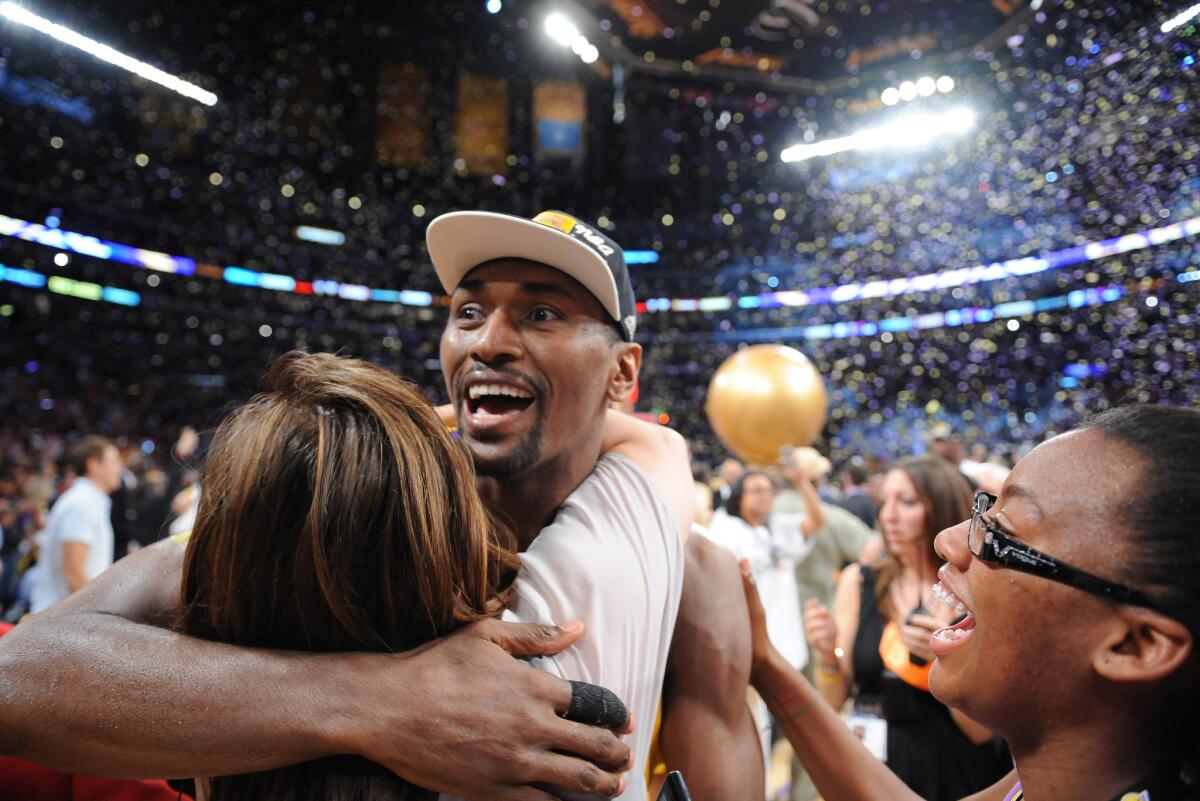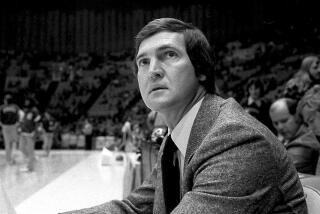Psychologists have helped with the mental side of the NBA game

Metta World Peace celerates after the Lakers’ win over the Boston Celtics in Game 7 of the NBA Finals on June 17, 2010.
Confetti fluttered from the ceiling, and fans screamed after the Lakers won Game 7 of the 2010 NBA championship. Amid the chaos, Metta World Peace was interviewed on live television, and he made a comment that went viral.
“My psychiatrist, she really helped me relax a lot, thank you so much,” he said. “It’s so difficult to play. There’s so much emotion going on during the playoffs, and she helped me relax.”
It was a moment that stood out — an athlete being vulnerable about his mental health during a high-profile event.
Join the conversation on Facebook >>
Increasingly, NBA teams are acknowledging the importance of the mental aspect of the game. Nearly half of the 30 teams have psychologists working full time or as a consultant on call.
World Peace said if he hadn’t seen a therapist during the 2010 playoffs, the Lakers might have one fewer championship banner. “I wouldn’t have been able to deal with certain things,” he said. “I don’t think I would have been as effective in that game without my psychologist.”
The Dallas Mavericks have had psychologist Don Kalkstein on staff for 15 years. While coaches closely examine offense and defense, Kalkstein focuses on something else. “[Players] do so much training, physically, fundamentally, that they often lack mental skills training,” he said.
Kalkstein said when a player averages, say, 20 points a game, he’s expected to get those points despite troubles in his personal life — and that creates added pressure. He teaches them tools to lessen that pressure.
“We don’t want the thought process to be ‘I have to make this shot,’” Kalkstein said. “We want the thought process to be, ‘I’m going to catch and shoot, I’m going to get myself in a good position.’ So they concentrate and focus more on the process, which eliminates what we consider pressure and anxiety.”
Another tactic he uses is something called a concentration grid — players cross off numbers 0-to-100 on a grid in sequential order as quickly as they can in one minute. He distracts them as they do the task. “They learn to develop really laser focus when they’re asked to do that, instead of people talking about, ‘Hey, you got to concentrate,’ or ‘You got to focus,’ but they never tell them on what or how to,” Kalkstein said.
Mavericks star Dirk Nowitzki, now in his 18th NBA season, said teams would benefit from making a psychologist available for players. “It really helps the young guys. I mean he helped me when I was young,” he said.
For Antawn Jamison, who played for six teams in his long NBA career, having a psychologist to talk to as a rookie with the Golden State Warriors in 1998-99 was critical.
“Dealing with being away from my family and friends, also not playing particularly well, not understanding where the coach is coming from … just having to figure out how to pay my bills — I had a lot going on,” Jamison said. “I had a guy who really was there for me to deal with the ups and downs; he was the team psychologist.”
Before World Peace entered the NBA, he’d grown up in a rough neighborhood surrounded by drugs in the Queensbridge projects of Queens, N.Y. He once watched one of his friends get stabbed to death by another player during a pickup game.
His NBA career has been filled with fights, including the infamous “Malice at the Palace” in 2004, when he attacked a fan in Detroit for throwing a drink at him, sparking a brawl between players and fans. He was suspended for 73 games without pay.
In recent years, he has tried to remake himself and says he’s now friends with the fan he fought with years ago. He raffled off his 2010 NBA championship ring to raise more than $500,000 for charity to help high-risk youth on mental health issues.
World Peace said seeing a psychologist changed his life. “I didn’t understand myself,” he said. “So I was pretty much taught how to handle my emotions.”
But not all players feel comfortable confiding in a psychologist, especially one associated with their team.
Get the latest in sports with our free newsletter >>
Clippers forward Josh Smith said when he played for Houston last season, many of his Rockets teammates confided in the team’s psychologist, but he never had the desire. Even though psychologists are bound to confidentiality, he didn’t feel safe opening up to a someone receiving a paycheck from the Rockets.
“It might not be true, but I just feel like they’d go and tell the organization,” he said. “We’re considered their investment, why wouldn’t they want to know what’s really going on?”
Smith, however, said those teammates who consulted with a therapist weren’t judged.
“No, nobody frowned upon it,” Smith said. “It was like, whatever you feel like you need to do. If you’re going through something, it puts a strain on you, and it affects your game. And if it affects your game, it affects the team’s play.”
For Jamison, seeing a psychologist might have saved his career. When he entered the NBA at 22, he told his parents they wouldn’t have to work anymore. He needed to be successful, and when that didn’t immediately happen, it scared him.
“I wasn’t particularly playing well that year, wasn’t playing at all really,” he said of his rookie season. “I really started to doubt would be able to be a successful NBA player. It was really the first time ever that I had a challenge that I couldn’t produce and couldn’t figure things out.”
Jamison went on to become a two-time All-Star during his 16-season career. His psychologist helped him get started.
“It was a way for me to keep my sanity,” he said. “One bad year [and] not having somebody to guide you in the right direction could really make or break you.”
Follow Melissa Rohlin on Twitter @melissarohlin
MORE NBA NEWS
Stephen Curry is the AP male athlete of the year
Clippers win Christmas game over Lakers, 94-84
Five takeaways from the Clippers’ 94-84 win over the Lakers
More to Read
Go beyond the scoreboard
Get the latest on L.A.'s teams in the daily Sports Report newsletter.
You may occasionally receive promotional content from the Los Angeles Times.











